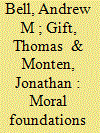| Srl | Item |
| 1 |
ID:
147910


|
|
|
|
|
| Summary/Abstract |
What explains armed-group conduct toward civilians in war? The National Resistance Army (NRA) of Uganda demonstrated notable restraint toward civilians during its wars in northern Uganda in the 1980s, restraint that is puzzling given the overdetermined predictions for mass atrocity under rationalist, identity, and regime-type theories. Instead, the NRA case demonstrates that military culture—the organizational norms underlying combatant socialization—is a primary determinant of armed-group behavior, influencing combatant conduct in ways not conceptualized under existing theories of victimization. This review of the NRA case, based on field interviews with Ugandan military officers and examinations of Ugandan documentary archives, reveals three key points regarding the role of military culture in effecting restraint. First, the NRA case shows that organizational factors like military culture can determine military behavior toward civilians. Second, it reveals that theories of military culture, incorporating both formal and informal mechanisms of combatant socialization, can provide a more complete theoretical account than existing theories of armed-group conduct. Finally, the NRA provides potential hypotheses for mechanisms through which culture influences military behavior. I analyze the effect of culture on the NRA's conduct as a plausibility probe, generating inductive insights drawn from detailed field research to shed light on the organizational drivers of armed-group restraint. The NRA case thus points the way to a reconceptualization of military culture and the role of organizational factors that influence conflict behavior.
|
|
|
|
|
|
|
|
|
|
|
|
|
|
|
|
| 2 |
ID:
187554


|
|
|
|
|
| Summary/Abstract |
How does partisan identification shape the attitudes of US military officers toward the protection of civilians in war? Drawing on unique cross-cohort surveys of soon-to-be commissioned officers in 12 Army Reserve Officers’ Training Corps (ROTC) training battalions, we find that Democratic-leaning cadets generally prioritize norms of civilian protection more than Republican-leaning cadets when confronted with competing values of military advantage and force protection as part of a ‘combatant’s trilemma’. This gap remains partially resilient after sustained exposure to military training and socialization, including in the norms of restraint embodied by principles of combat ethics and the law of war. We attribute these partisan differences to insights from Moral Foundations Theory (MFT), which suggests that the moral values of Democrats and Republicans guide their views toward the individual use of force in combat. Our findings have important implications for comprehending the impact of political ideology and military training and socialization on attitudes regarding restraint toward civilians in war. Given the widely recognized conservative composition of the US military’s membership, these findings may help to further inform understanding of US military operations and the underlying causes of US adherence to – or violation of – the laws of armed conflict.
|
|
|
|
|
|
|
|
|
|
|
|
|
|
|
|